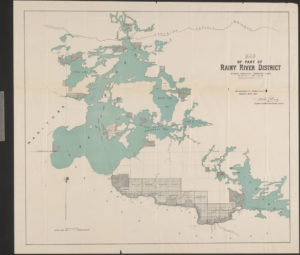American Indian

Du Vernet refers to “American Indians” twice in his diary. The first instance occurs when he writes about how Tom Overcome and his family went on a long journey to visit the “American Indians.” Du Vernet explains that Mr. Johnston had pleaded with Tom not to undertake the journey for he “felt so strongly the danger of this.” Tom, with some encouragement from his wife, ended up going on the trip, but tragedy befell. Tom’s wife died on the journey and their baby was soon lost starvation. The second mention occurs on Monday July 18, when Du Vernet references how “American Indians” had come over to the “Canadian” side of the Rainy River to gamble.
Ojibwe on both sides of the Rainy River maintained their connections with one another through social engagements, as well as economic and cultural exchanges, despite the fact that the Canadian-American border separated them. The establishment of a border between the United States and what is now Canada ignored the fact the Ojibwe constituted their own distinct Nation, whose territory would have straddled both countries on either side of the Rainy River. The border would have been quite arbitrary to the Ojibwe, who continually travelled the expanse of the land and river freely.